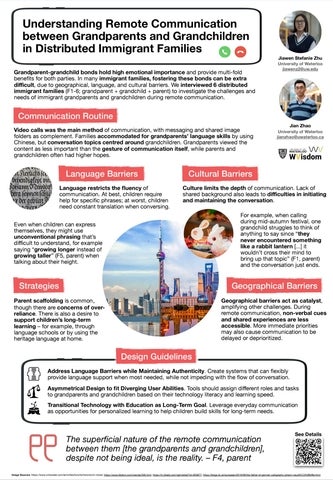Jiawen Stefanie Zhu (BCS ’24) has won the Best Poster award at Graphics Interface 2025, Canada’s top conference on computer graphics and visualization, and human-computer interaction.
Jiawen completed her undergraduate studies at the Cheriton School of Computer Science in 2024. Now, as a PhD student at the University of Washington, her research focuses on interactive systems that can enhance human–human and human–AI collaboration. In particular, she is “exploring ways to help people navigate our multilingual world.”
In line with her current work, Jiawen received the award for her undergraduate research, presented in a poster titled Understanding Remote Communication between Grandparents and Grandchildren in Distributed Immigrant Families.
Jiawen's poster for GI 2025

“This study highlights the unique challenges immigrant families face in maintaining grandparent–grandchild bonds across distance, language, and culture,” says Professor Jian Zhao, Jiawen’s undergraduate supervisor. “It calls for more inclusive communication technologies that support these intergenerational relationships. With most research focused on co-located families, this study brings attention to the overlooked needs of geographically separated immigrant families. It underscores the role of technology in bridging intergenerational and intercultural divides.”
Unfortunately, some immigrant families struggle to form close and meaningful relationships because their generations live far apart. Although technology like video calling can bridge the distance, family members can still face language and cultural barriers. Some grandchildren are unable to speak their grandparents’ native language, causing their parents to step in as translators. However, many parents worry that this constant intervention may prevent their child from learning the family’s tongue. Additionally, cultural differences can make it challenging for families to share common conversational topics. Overall, this lack of communication can cause immigrant children to lose cultural traditions and hinder development of close relationships with grandparents.
To tackle this issue, Jiawen and Professor Zhao interviewed six Chinese immigrant families about their experiences, leading to several technological design guidelines. Namely, this technology should help facilitate conversations — such as incorporating embedded translation features — while incentivizing the child to learn their family’s language. It should also accommodate the asymmetric technological abilities across different user groups. For example, the grandchildren should handle most of the app’s features while their grandparents are on the receiving end.
“In HCI, the solution space is constrained not only by technological limits but also by human values. Our study illustrates this: participants envisioned not perfect translation tools, but rather transitional systems that bridge fundamental gaps without overshadowing the core experience – functioning much like air.”
Jiawen’s research shows that connecting with a family member a continent away doesn’t have to be hard if you have the right technology.